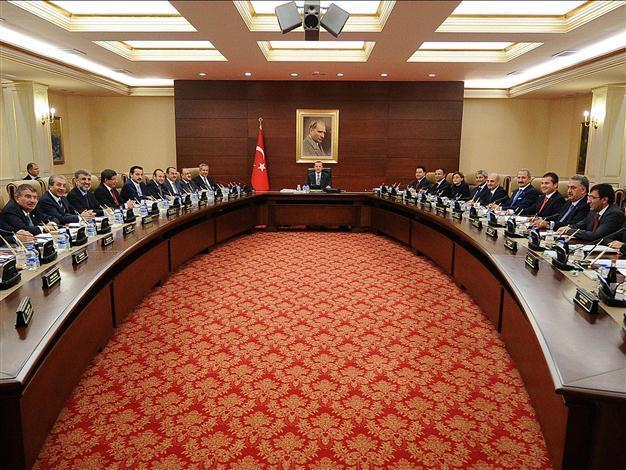The ‘three term’ pressure in ruling party
ANKARA – Hürriyet Daily News

The expectation is high that a change will occur in the Cabinet after the ruling Justice and Development Party (AKP) convention in fall as the party prepares for the convention amid inner-party debates over ban on being elected for a fourth term.
The Justice and Development Party (AKP) is preparing for its ordinary congress in fall amid inner-party debates over ban on being elected for a fourth term and the presidential elections in 2014.Prime Minister Recep Tayyip Erdoğan may give important clues for the 2014 election and the post-election era; he may also present his preferences for the party’s new top administration. The expectation is high that a change will occur in the AKP administration and the Cabinet. But in deeper “corridors” of the party, the “three term” anxiety dominates.
Many deputies and some ministers share the concern this situation will put the AKP in trouble in the future.
Speaker of Parliament Cemil Çiçek; former Speakers of Parliament Köksal Toptan and Mehmet Ali Şahin; Deputy Prime Ministers Bülent Arınç, Ali Babacan, Beşir Atalay and Bekir Bozdağ; Ministers Faruk Çelik, Mehdi Eker, Sadullah Ergin, Egemen Bağış, Hayati Yazıcı, Taner Yıldız, Nihat Ergün, Fatma Şahin, Binali Yıldırım, Recep Akdağ, Suat Kılıç and Idris Naim Şahin; former Ministers Vecdi Gönül, Faruk Nafiz Özak and Nimet Çubukçu – none of these can be candidates in the next general elections.
The party administration is also becoming emptied. AKP Deputy Presidents Abdülkadir Aksu, Haluk Ipek, Bülent Gedikli, Reha Denemeç, Hüseyin Çelik, Ahmet Edip Uğur, Ömer Çelik, Hüseyin Tanrıverdi and Salih Kapusuz are banned from running for office. Also, AKP Deputy Group Chairmen Nurettin Canikli and Mustafa Elitaş cannot become candidates.

AP photo
When the picture is like this, there is increasing pressure for Erdoğan and his close aides to prevent the staff who have created the AKP from staying out of politics. Many deputies and some ministers share the concern this situation will put the AKP in trouble in the future. They are making an effort to have this clause changed in the fall congress. Erdoğan, on the other hand, who used to defend that article, has not shown his true colors yet.
Another issue debated in the party is the presidential elections. While there are few doubts over the candidacy of Erdoğan for the post, especially after a recent bill blocking the way of a possible candidacy of President Abdullah Gül, there are questions about the party and the country in the post-election era.
Science and Technology Minister Nihat Ergün said over the weekend that the country will have “indeed a semi-presidential system” after the presidential elections, an opinion shared by many in the ruling party.
The candidates will hold rallies, give promises to the people, everybody will know what the next president thinks,” said Ergün, adding that the authority given to the president by the constitution will create a new type of leader. The minister added that no one will oppose the candidacy of Erdoğan and he will “suit the Çankaya Presidential Palace.”
The inner-party politics in the ruling party will continue to shape the Turkish politics for some time.
Will DTK discuss ‘withdrawal’?
ANKARA - Hürriyet Daily News
There is pressure coming from the grassroots both for the Peace and Democracy Party (BDP) and for the DTK to “withdraw from Parliament.” But both structures are resisting this pressure. The pressure is expected to increase at the congress. There is a demand that this opposition should take to the streets by Nevruz, a festival that marks the beginning of spring. My impression is that even though they may decide to say “Yes to tougher policies,” those politicians who have commonsense within the BDP and DTK are not at the stage where they will leave the parliamentary platform.
Deniz Baykal has a key role in CHP
ANKARA - Hürriyet Daily News
All three teams are separate amendments to the statute. Baykal is opposing Sav who wants to revoke the party leader’s mandate to appoint the Central Executive Board (MYK). Kılıçdaroğlu, just like Baykal, wishes to appoint the MYK alone. The teams of Kılıçdaroğlu and Baykal might make an alliance on this clause. It is also known that Sav is in search of alliances with Baykal over other clauses. Baykal can play a key role by aligning with both sides on different clauses and making those amendments he wishes to make.
The tactic wars are restarting in the CHP, which was a bit “still” before the congress. All of them aim to obtain the leadership position and the seats in the party assembly so they can climb to power inside the CHP.











